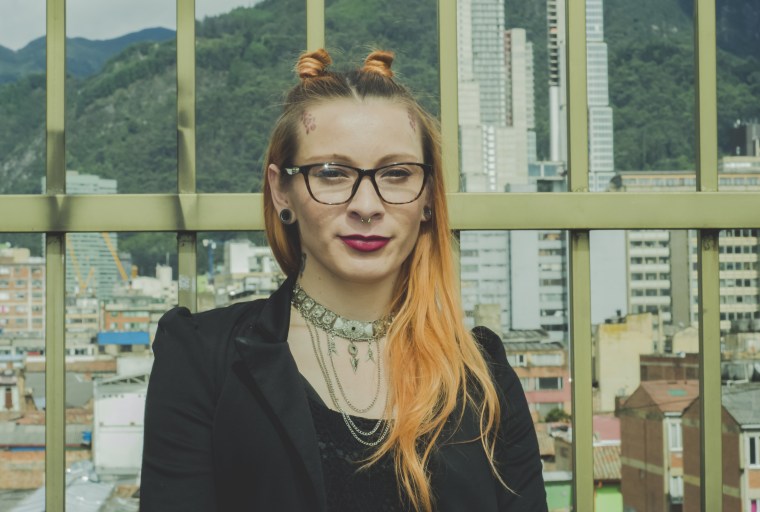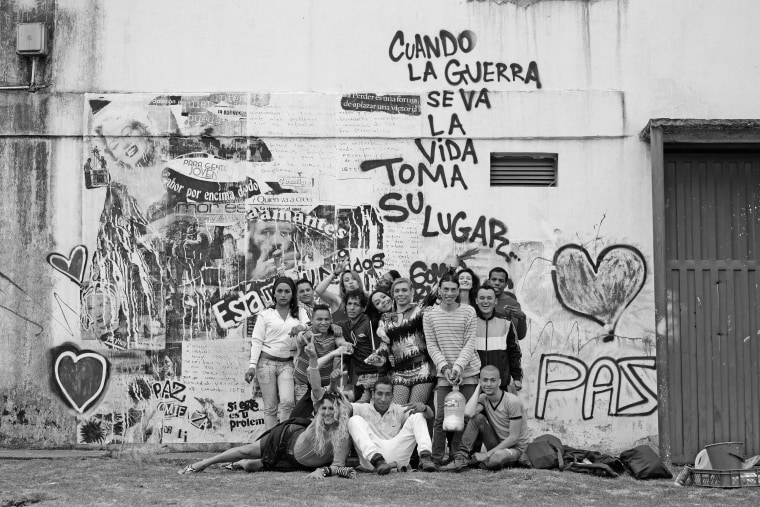Katalina Ángel’s return to La Picota was, she said, a bittersweet experience.
As a transgender woman and former inmate in one of Colombia’s toughest male prisons, located on the southernmost outskirts of capital city Bogotá, the hostility and brutality that had been her life for three years stirred painful memories.
“There were ugly situations I didn’t want to remember; it just wasn’t worth it,” the 30-year-old said during an interview in Bogotá’s downtown Santa Fe neighborhood.

But this time, in 2013, a year on from her release, things were different: She was back to launch Bodies in Prison-Minds in Action, a rights-based project that has done much to empower the lives of vulnerable transgender women in Colombian jails.
“I was so happy to see the girls again,” she said. “At that moment, they knew that what I had told them was true, that I wasn’t going to forget them.”
Ángel was also keeping a promise she had made to herself.
Detained in 2006 for a minor drug charge, a decision to sentence her to house arrest was revoked. Fearing prison, she went on the run, ending up in Santa Fe, Bogotá’s designated tolerance zone set up to regulate sex work. Here, an estimated 600 transgender women work as prostitutes, most in extremely precarious conditions.
“It was a really sad time, working the streets, being in this world of drugs and prostitution,” she said. “And to see the conditions in which I lived, where I slept, it made me so angry, so sad that my life had just collapsed.”
Eventually the law caught up with her, and she was sent to La Picota.
“I told myself that I wouldn’t return to the streets, I wouldn’t go back to taking drugs, that I’d fight for who I wanted to be.”
Related: Colombian Trans Male Band Mixes Music and Advocacy
For Ángel, writing for the prison newspaper and organizing dance and theater workshops for the other transgender women tempered the brutishness of incarceration. But, with her stretch coming to an end, she feared for the friends she was leaving behind.
“I had certain privileges inside because I knew a lot of people, I knew how to work the system for everyone’s benefit,” she said. “But the girls weren’t so friendly with the doctors and guards, so I left prison thinking that things would collapse, that our group would break up.”
Birth of an Organization
After her release, Ángel wasted no time making contacts and drafting proposals. With a small grant and backing from Santa Fe-based collective Red Comunitaria Trans, the foundation for Bodies in Prison-Minds in Action was built.
The project quickly expanded, with a team of lawyers, counselors, psychologists and activists delivering initiatives ranging from legal and psychosocial support to film clubs and discussion groups.
The focus turned to safeguarding rights.

In 2011, following a high profile case involving the mistreatment of a transgender woman in Yopal prison, Colombia’s constitutional court ordered prison authority Inpec to sort out its policies to guarantee the welfare of LGBTQ prisoners.
Inpec finally complied with the court order last year, revealing a new directive that instructed prison guards to allow transgender inmates access to makeup, clothes and accessories, along with visits from same-sex partners.
“The directive was a first step toward respecting these identities,” said Estefanía Méndez, coordinator and legal advisor at Bodies in Prison-Minds in Action. “But it overlooked some very important things, such as health and all the treatments associated with the construction of a transgender identity.”
Introduction of the 'Cartilla'
Responding to this legal ambiguity, the activists produced a "cartilla," an information booklet containing practical and legal guidelines for the prisoners. Some 500 copies were published and distributed to inmates and staff in La Picota and other Colombian jails with significant transgender populations.
“The cartilla is a way for the girls to understand their rights,” Méndez said. “It’s letting them know, ‘What happens if they try to cut your hair, or confiscate your belongings, or act improperly? How do you file a complaint against prison staff?’”
Laura Zamora, a 31-year-old transgender inmate at La Picota and a co-author of the upcoming second version of the cartilla, said the initiative enabled the girls to defend spaces that had been won for LGBTQ people.
“These are our rights, they’re not favors or privileges,” she said.
A recent report by Bogotá-based Colombia Diversa underlined the urgency of protecting the country’s LGBTQ prisoners.
Alleged cases of physical and psychological aggression, sexual assault, threats, harassment and the use of prolonged solitary confinement against prisoners with diverse sexual orientations or gender identities were carried out with virtual impunity. The violence and discrimination were made worse by severe overcrowding, corruption and a crisis in the prison health care system, the report said.
“Things have improved a lot in La Picota,” Ángel said. “But it’s not the case in all the prisons — the girls don’t have these resources, they don’t have this empowerment. If we had the funds, we would distribute many more cartillas.”
Reintegration Into Society
Another of the project’s longer-term ambitions is to help ex-offenders reintegrate into society. For marginalized transgender women, though, a bid to build a new life is fraught with difficulties, in particular when it comes to health, housing and jobs.
Deysi Olarte Navarro, head of the sub-directorate for LGBTQ issues at Bogota’s Social Integration Department, said transgender people face a unique kind of discrimination. “It’s much harder for a trans woman to get a job because of the stigma against us,” Navarro said. “We’re seen as drug addicts, criminals, people who transmit diseases.”
The sub-directorate’s sexual and gender diversity center in Santa Fe last year provided around 300 vulnerable individuals with free education and training, with plans to double this figure in 2017.
Zamora, who, like Ángel, spent time in Santa Fe before La Picota, recognized that discrimination and family rejection often forced trans women onto the streets but refused to accept the label of "victim."
“Poverty and exclusion are things that we have appropriated ourselves. We need to generate new spaces that provide us with opportunities other than prostitution and drugs. We're not victims,” she said.
For now, the activists at Bodies in Prison-Minds in Action are focusing on their second cartilla, a much bulkier 90-page document that will include up-to-date information on accessing specialized health care and hormone replacement therapy.
“The first version did a lot of good," Katalina said. "But this second one will be even better.”